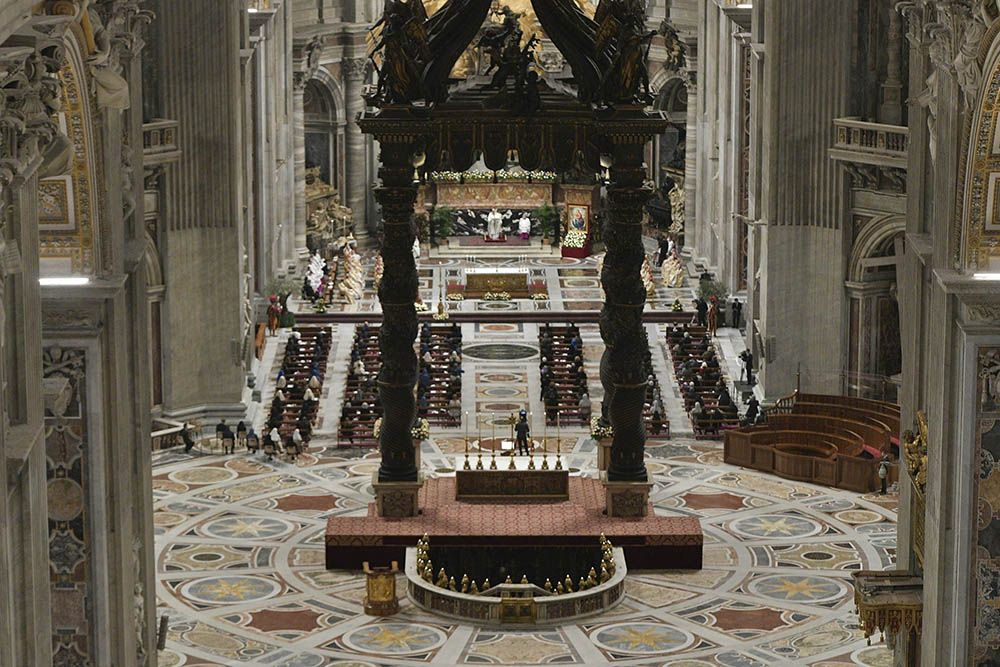
Pope Francis celebrates the Easter Vigil in St. Peter's Basilica at the Vatican April 3. (CNS/Vatican Media)
Sometimes you need to catch your breath when a Vatican official's speaking echoes a theologian's writings. Which way is this going to go?
Not long ago, the Vatican secretary of state, Cardinal Pietro Parolin, echoed a 50-year-old passage from a book by ... wait for it ... Swiss theologian Hans Küng.
Speaking on Spain's church-owned COPE radio network, Parolin underscored the Good Friday theme of Cardinal Raniero Cantalamessa, preacher for the papal household, and (perhaps unknowingly) brought forth a concept delineated by Küng 50 years ago: Some things can change, but internal church divisions are dangerous.
Dangerous they are, and many divisions fostered by the well-funded hard right in the United States are fixated on pelvic issues and incorporate forms of Trumpism. The relatively disorganized progressive left can tend to cross the line as well, in the opposite direction.
Still some things, Parolin said, can and should change, although "there is a level that cannot be changed, the structure of the church — the deposit of faith, the sacraments, the apostolic ministry — these are the structural elements."
So, who can change what? Canon law maintains power in the priestly class, although the combined power of the secular purse and the power of media can present checks and balances to clerical power. But money also supports clericalism. Money and media, especially social media, demonstrate the dangers of a clerical-political cash-infused soup.
No doubt about it, there are many people only too happy to replace anything vaguely post-Vatican II with their 1950s imaginings. There are probably just as many people annoyed at the ill-informed preaching of lace-dressed younger clerics and some bishops. (Recently, the bishop of Kildare and Leighlin, preaching during Ireland's RTE radio Mass, spoke about "Mary Magdalene with her colorful past.")
For those who think the Second Vatican Council was a good idea, there are many legitimate issues to discuss and many "merely ecclesiastical laws" that can and should be modified. And the majority of the church — the lay 99% — want to have a say. That is where the question of justice rises to the discussion. Aside from women ordained as deacons, a fact continually affirmed by historians, there are well-researched, well-documented, well-established facts that support lay participation in church governance.
Advertisement
Over the centuries, the church froze the laity out of any participation in governance and jurisdiction, and the Code of Canon law nailed that door shut. Canon 129.1 of the 1983 Code of Canon Law — written by then-Cardinal Joseph Ratzinger — firmly states that laypeople can cooperate but not participate in the power of governance.
So how does the church — that means all of us — view what is going on with cash, clericalism, divisions and authority? The money behind the alt-right is lay money aimed at affecting the way the church reacts to questions of justice: for the poor, for the needy, for women, in addition to the fixation on sexual matters.
Change or no change? The "no-change" folks have a lot of clerical support. Some "change" folks continue to speak, but many simply walk away.
We know the church can change because it has, usually to maintain clerical power. Over centuries, the church moved to remove women from any role in the celebration of Eucharist, to keep women outside the altar rail "fence" of superstitious misogyny. (The ridiculous beliefs remain: A bishop told me just the other day that his cathedral rector apologized because a woman was in the sanctuary during the Easter Vigil.)
Yet, there is some light at the top of the clerical ladder. Pope Francis changed law so women can be installed as lectors and acolytes. Cantalamessa warned against divisions. And Parolin's talk sounded like a passage from Küng's 1971 book, Why Priests? Küng writes:
A multiplicity of opinions, criticism, and opposition have their legitimate place and require a constant dialogue and the constructive display of contrary ideas. In all this the private sphere of every member of the Church should be respected (whether they are avant-garde or conservative in nature). In "matters of faith and morals" nothing can be attained with mere votes. In this regard, where it is impossible to obtain some sort of consensus (not unanimity), it is better to leave the question open according to ancient conciliar tradition.
Echoing Küng, Parolin said: "Sometimes ... one fails to distinguish between what is essential that cannot change and what is not essential that must be reformed, must change according to the spirit of the Gospel."
The secretary of state continued, "There is a whole life of the church that can be renewed."
But is there fear that change will cause the far right to take their money and run? You may recall that the church leaves many questions open because, as Küng points out, "it is impossible to obtain some sort of consensus."
I am not so sure avoiding decisions is the best route. It is never good to prefer peace to justice.






